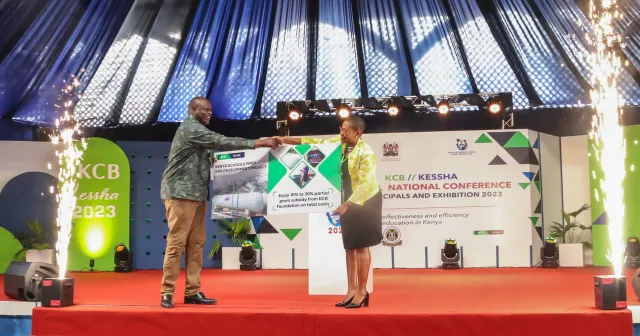KCB through its social investment arm, KCB Foundation Tuesday announced a programme that will see it extend financial support to learning institutions to transition to clean energy cooking solutions.
Under this arrangement, KCB Foundation will provide a partial grant of between 10pc to 30pc of the cost of buying and installing Liquified Petroleum Gas (LPG) equipment for qualified learning institutions.
The rest of the funding will be provided through pre-arranged financing solutions and will be available to all secondary schools, both public and private learning institutions countrywide.
The move is in response to the revelation that a large portion of fuel demand comes from Kenyan schools where about 90pc of public schools use firewood for cooking and pay up to $20,000 per year for the wood, which makes cooking fuel one of the biggest expenses in schools’ meal budgets.
Making the announcement, the Head of KCB Foundation, Caroline Wanjeri noted that the roll-out of the clean cooking programme is a testament to the bank’s collective efforts to support Africa’s drive to achieve SDG 7 with particular emphasis on universal access to modern energy services for all.
Additionally, it will enable it to scale up its efforts to support the adoption of clean and modern cooking solutions which uses less fuel, limit smoke emissions, and reduces the amount of greenhouse gases emitted to the environment.
“Schools have been identified as large contributors to inefficient cooking as they prepare high volumes of meals by consuming over 685,000 tons of firewood and charcoal per year. This has drastic consequences on the environment, economic development, and public health in a world where close to 2.6 billion people still lack access to clean cooking solutions. We are therefore keen to position schools as the cornerstone of Kenya’s sustainable future powered by affordable, reliable, clean, and modern energy distributed to all,” Wanjeri said.
To date, the bank has disbursed loans worth Kshs. 60 million to 30 schools across the country with KCB Foundation giving Kshs. 30 million in the form of grants during the pilot phase.
“KCB has been at the forefront of mobilizing the financial sector’s climate action and supporting carbon-positive projects in society. By supporting the transition to cleaner fuels like LPG, we shall be enabling learning institutions to realize up to 40pc savings in their cooking budget with better health and environmental outcomes, improved kitchen hygiene, and motivation of workers. It will also be an opportunity to build on our existing efforts to widen the range and reach of activities in support of a just energy transition that is partly spearheaded by our own greening programme dubbed “Linda Miti” which has seen us plant over 160,000 trees in 943 schools this year,” Wanjeri added.



